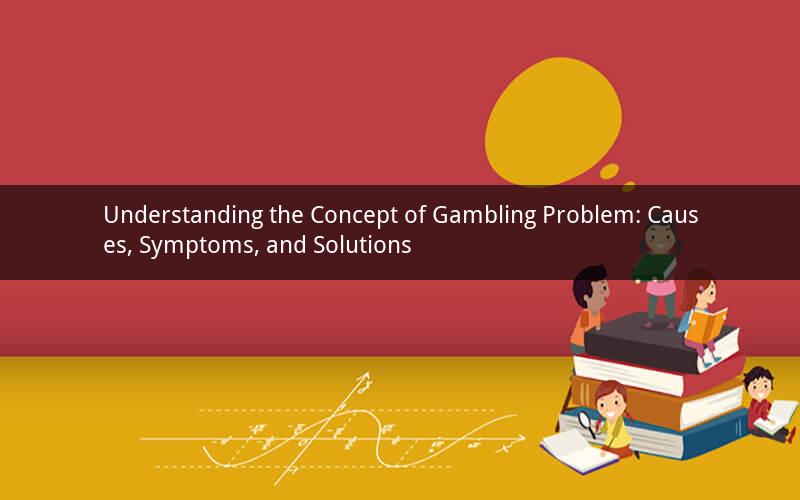
Introduction:
Gambling, a popular form of entertainment, has become increasingly accessible in today's digital age. However, when it becomes an obsession, it can lead to severe consequences. In this article, we will delve into the concept of gambling problem, its causes, symptoms, and effective solutions to help individuals overcome this addiction.
1. Definition of Gambling Problem:
Gambling problem, also known as gambling addiction or problem gambling, refers to a pattern of gambling behavior that disrupts an individual's personal, professional, or social life. It is characterized by an inability to control gambling activities, despite the negative consequences.
2. Causes of Gambling Problem:
Several factors contribute to the development of a gambling problem. These include:
a. Genetic predisposition: Research suggests that genetics play a role in the development of gambling addiction. Individuals with a family history of addiction may be more susceptible to developing a gambling problem.
b. Psychological factors: Certain personality traits, such as impulsivity, thrill-seeking, and low self-esteem, can make individuals more prone to gambling addiction.
c. Social factors: Peer pressure, exposure to gambling activities, and the availability of gambling opportunities can increase the risk of developing a gambling problem.
d. Environmental factors: Stress, financial difficulties, and other life events can trigger gambling behavior as a coping mechanism.
3. Symptoms of Gambling Problem:
Identifying the symptoms of a gambling problem is crucial for early intervention and treatment. Common symptoms include:
a. Preoccupation with gambling: Constant thoughts about gambling, planning and anticipating the next gambling session, and reliving past gambling experiences.
b. Loss of control: Inability to stop gambling despite negative consequences, even when trying to do so.
c. Lying: Hiding gambling activities from family, friends, and employers, as well as lying about the extent of gambling behavior.
d. Financial problems: Borrowing money, selling personal belongings, or taking out loans to fund gambling activities, leading to severe financial distress.
e. Emotional and psychological distress: Experiencing feelings of guilt, shame, anxiety, and depression due to gambling-related problems.
f. Legal problems: Engaging in illegal activities to support gambling habits, such as theft or fraud.
4. Treatment and Solutions for Gambling Problem:
Overcoming a gambling problem requires a comprehensive approach that addresses the underlying causes and symptoms. Some effective treatment and solutions include:
a. Cognitive-behavioral therapy (CBT): CBT helps individuals identify and change negative thought patterns and behaviors associated with gambling addiction.
b. Support groups: Joining a support group, such as Gamblers Anonymous, provides individuals with a community of peers who understand and support their recovery journey.
c. Financial management: Seeking professional help to develop a budget and manage finances effectively, reducing the temptation to gamble.
d. Stress management: Learning healthy coping mechanisms to deal with stress and other triggers that may lead to gambling.
e. Relapse prevention: Developing strategies to avoid relapse and maintain long-term recovery.
5. Frequently Asked Questions:
Q1: What is the difference between gambling and a gambling problem?
A1: While gambling is a form of entertainment, a gambling problem occurs when it becomes an obsession, leading to negative consequences in various aspects of life.
Q2: Can a person overcome a gambling problem on their own?
A2: It is possible to overcome a gambling problem independently, but seeking professional help and support from others can significantly increase the chances of successful recovery.
Q3: Are there any medications available to treat gambling addiction?
A3: Currently, there are no medications specifically designed to treat gambling addiction. However, some medications may help manage symptoms of co-occurring disorders, such as depression or anxiety.
Q4: Can a person develop a gambling problem without being a risk taker?
A4: Yes, a person can develop a gambling problem even if they are not a risk taker. Factors such as genetics, psychological predisposition, and environmental influences can contribute to the development of a gambling addiction.
Q5: How can I support someone with a gambling problem?
A5: To support someone with a gambling problem, it is important to be understanding, non-judgmental, and offer support without enabling their addictive behavior. Encouraging them to seek professional help and joining a support group can also be beneficial.
Conclusion:
Understanding the concept of gambling problem is essential for identifying and addressing the underlying causes and symptoms. By seeking professional help, joining support groups, and adopting healthy coping mechanisms, individuals can overcome gambling addiction and lead a fulfilling life.